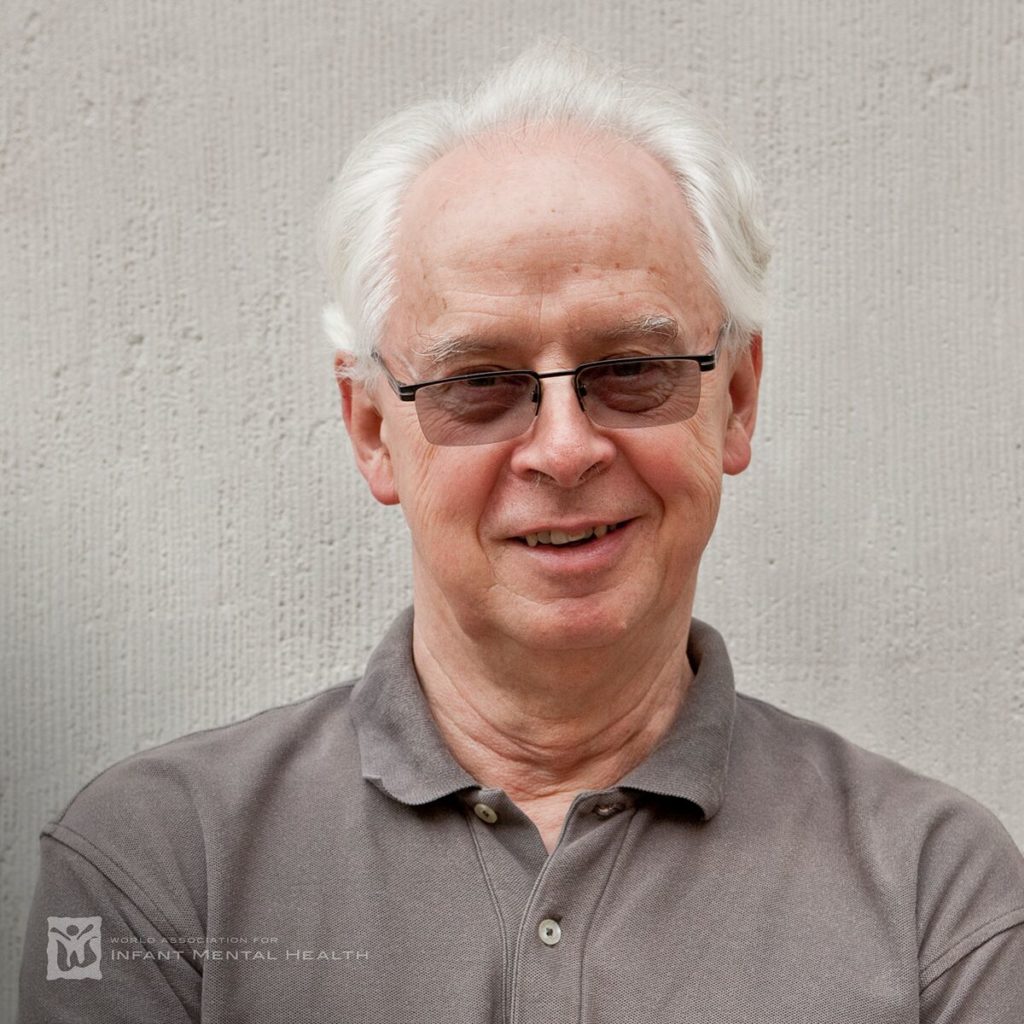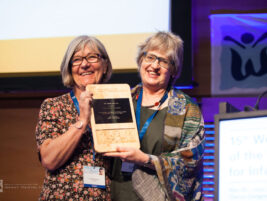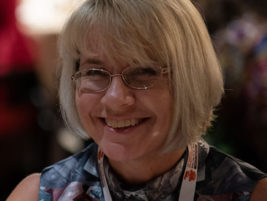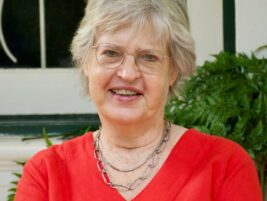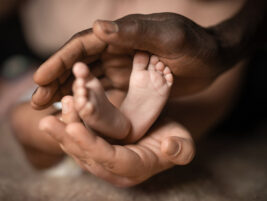Dear WAIMH colleagues and friends,
In the midst of these extremely stressful times around the world, I wish you well.
We have the COVID-19 pandemic, economic and political turmoil, conflict and ongoing mass displacement of children and families as well as natural disasters. We are also reminded of the 10th anniversary of the tsunami and the disaster in Fukushima, but as with other catastrophes around the world, Dr Hisako Watanabe and her colleagues in Japan show us what we can do as professional groups when we work together, sharing our observations, our learning, and our interventions in the interests of infants and families.
This process of sharing and learning from each other is so important. We from the WAIMH organisation and the extensive Brisbane Congress teams are really looking forward to meeting with as many of you as we can in June, either in-person or in the virtual space on-line. Indeed using the amazing communication technologies to which each of us has had to adapt, I truly hope that we will be able to reach even more people than in previous congresses. I know that previously many of our colleagues were unable to come to Rome, Prague or Edinburgh because of the distances and the cost involved, but hopefully, the relatively modest fee for on-line participation in the Congress should enable thousands of people to join up together.
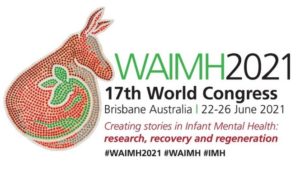
Participants from Australia and New Zealand who can be with us in Brisbane will have an extra special program, including a welcome reception, Congress dinner and the opportunity to meet with each other in person day by day over refreshments at the Convention Centre beside the Brisbane River. The traditional Pre-congress Institutes have undergone a chronological readjustment such that instead of being all day before the Congress, they will be spread through the middle hours of the Congress days.
Nonetheless, everyone will have an opportunity to share actively together through the Q&A sessions following scientific and clinical presentations and smaller group gatherings using zoom to talk with a number of the Congress presenters.
Emma Taylor from ICMS Australasia our Congress organiser, Dr Elisabeth Hoehn and Libby Morton from the local organising committee have done an amazing job pulling together such a flexible, creative program that will be accessible to huge numbers around the world. I’m doubly fortunate because I will be there in Brisbane which is just a two-hour flight for me and our colleagues in Melbourne.
With cautious enthusiasm, Australians have begun to return to gatherings of larger groups of people such as at major sporting events and at the theatre. I thoroughly enjoyed the return of the Australian Ballet to the stage a few weeks ago, where the dancers were so excited to be sharing their passion for dance with people in the audience. The venue was a big stadium at the Melbourne Tennis Centre, so Covid safe practice and social distancing were possible. For those of us fortunate to be in Brisbane for the Congress in June we will have the opportunity to meet in person, but also to enjoy what Brisbane has to offer in exhibitions, music, the arts and food!
The scientific program is exceptional, and I’m sure you will enjoy presentations from our four keynote speakers. Prof Helen Milroy from Western Australia will commence the Congress proceedings, building on the theme of the Congress, with her presentation entitled “Babies Born into Stories”, and will show us how storytelling, in particular, indigenous storytelling is such a powerful way to influence and strengthen babies, their relationships and their development. We are so fortunate to have Helen bring her wisdom to our Congress.
Prof Jonathan Green from Manchester is a pioneer in work with very young children at risk of developing autism. He has demonstrated how innovative clinical interventions focusing on early relational and social development can mitigate the development of autism in vulnerable infants.
Dr Rosario Montirosso is the chief of the 0-3 Center for the Study of Social Emotional Development of the at-Risk Infant at the IRCCS Eugenio Medea centre, Bosisio Parini in Italy, and he has been working with parent-infant relationship problems for at-risk infants for some 25 years. His presentation will take us into the rapidly developing field of applying neuroscience and epigenetics to our understanding of the role of the baby’s body, embodied interactions in the human infant’s attuned social interactions, and early development.
From the University of Michigan, USA, Dr Kate Rosenblum who is a clinical and developmental psychologist, directs the Zero to Thrive multidisciplinary program which promotes the well-being of families with young children experiencing major adversity. Dr Rosenblum is VP of the board of the Alliance for the Advancement of Infant Mental Health, one of our strong infant mental health partners.
WAIMH past President, Prof Kai von Klitzing, from Leipzig, will lead a key symposium considering how we need to acknowledge and understand the social and cultural aspects of attachments and relationships and how there is real diversity across different cultures and communities.
These amazing presentations represent only a tiny amount of the Congress program with something like 220 presentations much of which you will be able to view during the 4 ½ days of the Congress itself, but the rest over the subsequent six months at your leisure. I’m sure everyone who has attended a busy Congress has experienced the frustration of knowing that there are really interesting and important sessions that you like to be able to attend but you can’t because there is something else you really want to go to! With the Brisbane Congress, this should not be a problem as you’ll have the opportunity over the subsequent six months to listen to any or all of the presentations. This Congress represents really great value enabling participants to hear from their colleagues working at the grassroots, sharing the same sets of challenges and triumphs as well as acknowledged experts in research, policy, epidemiology and clinical service delivery.
Some people may feel a little intimidated by having to prerecord the presentation or use virtual technology to connect with Congress participants. Recording with Zoom is pretty straightforward, and the guidelines on our Congress website are easy to follow. I know at the beginning of the Covid-19 pandemic I was introduced to the whole new world of virtual conference technologies and teaching methods. Even more challenging was the thought of doing infant-parent work, meeting babies and their families by telehealth. I was dramatically surprised at how adaptable we can be using these technologies, and even more importantly how adaptable are babies, toddlers, people and their parents in adapting to use the technology. Especially seeing babies and parents face-to-face is the best, but when that is not possible I’m amazed at how even very small infants can respond to your voice, your face, your gaze, simple toys and sounds over the phone or computer screen. It is amazing how important gaze and voice are. At the Congress, there will be a number of presentations and opportunities to discuss the impact of the Covid-19 pandemic on our clinical work and the necessary adaptations of virtual technologies.
So, I am really looking forward to hopping on the plane in two months to go up to Brisbane, and equally to hopping on to the virtual network to meet up again with infant mental health colleagues all over the world. I hope that after the Congress you will also be able to link together in your own local infant mental health networks to discuss the challenging ideas, research, and clinical riches that the Congress will bring. Meanwhile, I do hope you keep well and safe with your own families and communities.
Authors
Campbell Paul,
Associate Professor, President of WAIMH,
Melbourne, Australia


